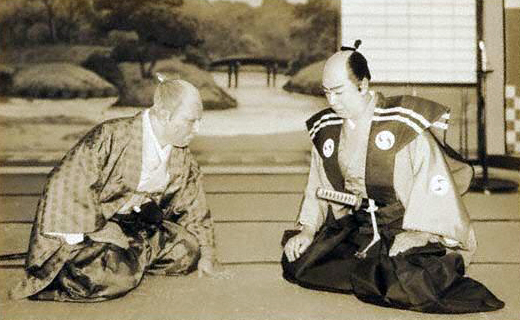| DAINI NO SHISHA |
| Play titles | Daini no Shisha Genroku Chűshingura The Second Messenger |
| Author | Mayama Seika |
| History |
"Daini no Shisha", the 2nd play of Mayama Seika's cycle "Genroku Chűshingura", was premiered in January 1935 at the T˘ky˘ Gekij˘ [casting]. |
| Structure |
"Daini no Shisha" is made up of 1 act (1 scene). |
| Key words |
Adauchi Ak˘ Ak˘ R˘shi Ak˘-han Ak˘-j˘ Asano Naganori Asano Takumi-no-Kami Banshű Daimy˘ Edo-j˘ Genroku Gishigeki Hara Mototoki Hara S˘emon Hatamoto Kar˘ Kira K˘zuke-no-Suke Kira Yoshihisa ďishi Chikara ďishi Kuranosuke ďishi Nobukiyo ďishi Sezaemon ďishi Yoshikane ďishi Yoshitaka ďno Kurobŕ ďno Tomofusa Onodera Hidekazu Onodera Jűnai Rekishigeki Seppuku Shinkabuki Shisha Yashiki |
| Summary |
Act I, scene 1: Banshű Ak˘-j˘nai ďhiroma The devastating news of the calamity reached the lord's residence at Ak˘ Castle in Banshű the previous night, delivered by the loyal retainers Hayamizu and Sugano. In response, all castle officials were urgently summoned for a conference under the guidance of the kar˘ ďishi Kuranosuke. They immediately set to work rectifying financial records and other matters, preparing for the worst. ďishi Kuranosuke, with unwavering determination, vows not to let the people of the fief suffer financially due to the disaster. He strictly orders that no outsiders be informed to prevent speculation and chaos. The gates are locked, to be opened only for the next messengers bringing news from Edo about the outcome. However, some self-seeking retainers, like the elder retainers ďno Kurobŕ and Okuno Sh˘gen, disagree with ďishi's policy. Their interests are solely focused on salvaging whatever money they can for themselves, disregarding the plight of the people of Ak˘. Amidst the prevailing tension, Kuranosuke hears the distant shouts heralding the arrival of two hurrying messengers by palanquin. As he prepares to meet them, his 14-year-old son, Matsunoj˘ [1], steps forward and earnestly requests to be made a regular retainer despite his youth. Kuranosuke gently declines, reassuring his son Matsunoj˘ that the Asano House has enough retainers and doesn't need to rely on someone so young. Matsunoj˘, who has secretly followed his father to the castle, expresses concern about his father's gentle nature, fearing it might falter in the face of disaster. However, Kuranosuke asserts his resolve to make measured decisions without yielding to rash actions. Soon after, the messengers Hara S˘emon and ďishi Sezaemon rush into the room. Elderly Hara, usually composed, appears almost crazed due to the weight of the tragic news he bears, yet relieved to have finally arrived at Ak˘. Kuranosuke maintains his composure and listens to the heart-wrenching report. His fears are confirmed - Lord Asano has been sentenced to death through seppuku, and the fief has been confiscated. Details of the lord's death and the situation of the widow, who has become a nun, are revealed. Additionally, the messengers bring an enigmatic unfinished message from Asano, hinting at a hidden meaning and a desire for revenge. The heavy burden of grief weighs upon Kuranosuke and his comrades once all the details of the calamity become clear. However, amidst their sorrow, another visitor arrives - Onodera Jűnai [2] from the Ky˘to court, who has rushed by boat from Ky˘to upon hearing the news. He brings sympathetic messages from influential court members and even the emperor himself. Kuranosuke is deeply touched by the concern expressed by the Ky˘to court regarding the shogunate authorities' handling of the matter. The emperor's show of sympathy bolsters his secret determination to pursue revenge against Kira Yoshihisa, regardless of the Shogunate's position on the issue. |
| Notes |
[1] Later known as ďishi Chikara. [2] Onodera Jűnai is the Second Messenger of the title of this drama. Actually the third if we consider that Hara S˘emon and ďishi Sezaemon were the 1st and 2nd messengers. |
 |
|
The actors Ichikawa Ennosuke II and Ichikawa Sadanji II playing the roles of Onodera Jűnai and ďishi Kuranosuke in the drama "Daini no Shisha", which was staged in January 1939 at the T˘ky˘ Gekij˘ |
|
|
| Contact | Main | Top | Updates | Actors | Plays | Playwrights | Programs | Links | FAQ | Glossary | Chronology | Illustrations | Prints | Characters | Derivatives | Theaters | Coming soon | News |